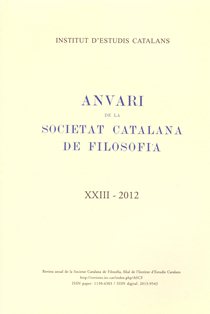Espai
Article Sidebar

Main Article Content
Pau Pedragosa
The concept of space is not specific to Phenomenology. As a philosophical problem
space has so much history as philosophy itself. But Phenomenology gives to it an original sense that can not be separated from this history, especially the recent one, that of modern philosophy since Descartes. In modern times space has been reduced to a purely quantitative lifeless extension. The emptying of life from space had its correspondence with the classical modern physics that conceptualized space as pure exteriority and as empty container. The consecuence was the strengthen of the inner life of
subjectivity. The great contribution of the phenomenological concept of space can be
summarized as the «return to space»: Phenomenology has recovered space for life, it has
made space inseparable from time, from the movement of the body, from the subjectivity
and from the understanding of being. We will see the important phenomenological contributions of Edmund Husserl and Martin Heidegger. First, we will analyze Husserls phenomenology of perception, the lived body and the historical genesis of the concept of objective and abstract space. Then we will study Heideggers notion of the space of things and the space of human beings (Dasein) in Being and Time. We will see how space acquires a central role in his later work to the point of understanding the task of philosophy itself as the thinking of place or topology of being. We will conclude with the reception of the phenomenological concept of space recognizing the extraordinary influence it has had in what is
called the «spatial turn».
space has so much history as philosophy itself. But Phenomenology gives to it an original sense that can not be separated from this history, especially the recent one, that of modern philosophy since Descartes. In modern times space has been reduced to a purely quantitative lifeless extension. The emptying of life from space had its correspondence with the classical modern physics that conceptualized space as pure exteriority and as empty container. The consecuence was the strengthen of the inner life of
subjectivity. The great contribution of the phenomenological concept of space can be
summarized as the «return to space»: Phenomenology has recovered space for life, it has
made space inseparable from time, from the movement of the body, from the subjectivity
and from the understanding of being. We will see the important phenomenological contributions of Edmund Husserl and Martin Heidegger. First, we will analyze Husserls phenomenology of perception, the lived body and the historical genesis of the concept of objective and abstract space. Then we will study Heideggers notion of the space of things and the space of human beings (Dasein) in Being and Time. We will see how space acquires a central role in his later work to the point of understanding the task of philosophy itself as the thinking of place or topology of being. We will conclude with the reception of the phenomenological concept of space recognizing the extraordinary influence it has had in what is
called the «spatial turn».
Article Details
How to Cite
Pedragosa, Pau. “Espai”. Anuari de la Societat Catalana de Filosofia, no. 23, pp. 191-08, https://raco.cat/index.php/AnuariFilosofia/article/view/264226.
Most read articles by the same author(s)
- Pau Pedragosa, Dolor i cultura: Una aproximació fenomenològica a la relació entre dolor i creativitat , Anuari de la Societat Catalana de Filosofia: No. 28-29 (2018)
- Pau Pedragosa, Fenomenologia de l'arquitectura sobre la nociío de tipus arquitectònic , Anuari de la Societat Catalana de Filosofia: No. 17 (2006)
- Pau Pedragosa, Homenatge a Gadamer : Art i hermenèutica , Anuari de la Societat Catalana de Filosofia: No. 14 (2002)